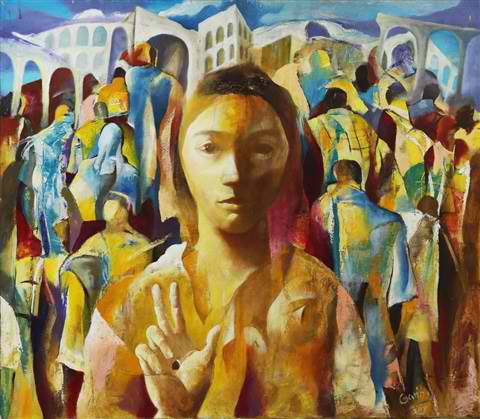Ms. Snap Mabanta, IFI
 Ps 27: 1, 7-9, 13-14
Ps 27: 1, 7-9, 13-14
Gen 15:5-12, 17-18
Phil 3:17-4:1
Luke 9:28-36
28 About eight days after Jesus said this, he took Peter, John and James with him and went up onto a mountain to pray. 29 As he was praying, the appearance of his face changed, and his clothes became as bright as a flash of lightning. 30 Two men, Moses and Elijah, appeared in glorious splendor, talking with Jesus. 31 They spoke about his departure,[a] which he was about to bring to fulfillment at Jerusalem. 32 Peter and his companions were very sleepy, but when they became fully awake, they saw his glory and the two men standing with him. 33 As the men were leaving Jesus, Peter said to him, “Master, it is good for us to be here. Let us put up three shelters—one for you, one for Moses and one for Elijah.” (He did not know what he was saying.)
34 While he was speaking, a cloud appeared and covered them, and they were afraid as they entered the cloud. 35 A voice came from the cloud, saying, “This is my Son, whom I have chosen; listen to him.” 36 When the voice had spoken, they found that Jesus was alone. The disciples kept this to themselves and did not tell anyone at that time what they had seen.
Transfiguration would often be narrated as one moment when Jesus’s ‘divine’ side is revealed. There were clouds enveloping Jesus, Peter, John and James. Jesus’ face changing, and his clothes so bright and shining, while talking to the prophets of long time ago (what we know as characters in the Old Testament). And yes, they were somewhere up in the mountains. Indeed, it was a glorious moment for the three disciples who have witnessed and experienced Jesus’ transfiguration.
But there is more to this experience of heavenly realm than what it appears.
The ‘This’ As Context
28 About eight days after Jesus said this, he took Peter, John and James with him and went up onto a mountain to pray.
It was interesting that the transfiguration story started with ‘this’. And one has to go to the verses shortly before this text in order to make sense, and get the context before the transfiguration occurred. In the whole of Chapter 9, Jesus was seen sending out his disciples to do what they had to do. It was told that he gave them power and authority to cure the sick, cast out demons, and proclaim the good news to the people (Lk. 9:1-5). At some point of doing their work, they needed to feed more than 5,000 people in the mountain, because people who have heard of him and their missionary work kept on following them (Lk 9:10-17).
In verse 18-20, Peter called him as God’s Messiah, the one who would fulfill God’s promise here on earth.
All of these have gotten the attention of King Herod (Lk 9:7-9), the ruler in Galilee and Jerusalem, who at a slight provocation, would feel threatened by anyone who becomes influential to the public.
The ‘this’ comes in chapter verses 21-27, immediately before the said Jesus’ transfiguration. He predicted his own passion and death. Turning to his disciples and to a crowd, he said, “The Son of Man must suffer many things and be rejected…and he must be killed and on the third day be raised to life…Whoever wants to be my disciple must deny themselves and take up their cross daily and follow me…”
Jesus in the whole narrative in Luke 9 was doing his earthy missions together with his disciples. He organized and sent out his disciples. He was healing the sick and casting out demons as earlier said. He was proclaiming the good news particularly to the poor people. In the same synoptic gospel in Mark (chapters 7 and 8), he was seen curing a blind man in Bethsaida, healed a deaf and a mute man, casting the demon from the body of the Syrophoenician woman’s daughter, and challenging traditions that he thought were hypocritical and does not follow God’s commandments.
The ‘this’ was therefore a premonition from Jesus that while he is faithfully doing his mission, it will not be easy. The road to Jerusalem after the transfiguration before the glorious resurrection will be rocky, dangerous, and challenging. It is taking up the cross.
Transfiguration: The Call to take up the cross, and the not-so-easy journey to Jerusalem
Pasanin mo ang krus
Landasin ang kalbaryo
Itayo ang bantayog ng tao
Damahin mo ang hirap
Alamin ang liwanag
At sa bukas ang bago’y masdan.
These lyrics of a song would probably summarize the spirit of the text. This is what Jesus is telling us in the story. He knew he was getting the ire of rulers for challenging the way they govern the people. He was speaking against what wasn’t right, he radically questions the systems that kings and ruler (Herod, Julius Cesar, and others, for that matter) instituted that oppressed people.
When Elijah and Moses appeared to Jesus in the text, they talked about departure, which will come full circle in Jerusalem. Also, towards the end of the chapter (Lk 9:51), Jesus is said to be heading to Jerusalem with his disciples.
For Luke, the mission of Jesus is a type of exodus. As Moses led the people from slavery into freedom, so Jesus would do likewise.[1]
And it wouldn’t be easy. The departure to Jerusalem wouldn’t be easy. He knew he will be killed. Enough proof to say is his prediction of his own death twice just in this chapter (Verses 21-27, 44-50). But he will resurrect there also, giving the story of transfiguration significant imperative to Jesus’ association to Jerusalem.
As they are traversing the road to Jerusalem, Jesus challenge his disciples, that whoever wishes to follow him must be willing to take up the cross. They must be willing to suffer, and take whatever risks that may come along the way.
This text is so timely and fitting when at present an increasing number of church leaders are publicly vilified, shamed, and even openly harassed. They are targets just because they speak up the truth, and dare to announce the good news of salvation and deliverance of the suffering masses. Our Church leaders are speaking up against government policies that do not serve the interest of the people . Jesus experienced the same in Jerusalem. Our churches’ call to stop the bloody war on drug that killed thousands of the poor, and the abhorrence to gruesome corruption in the bureaucracy that takes away development opportunities for the least are the stance our church leaders took that resulted to their persecution by the powers that be. Some are tagged as terrorists, some would receive direct death threats for doing so. Bp. Ambo David of the Diocese of Novaliches, Bp. Felixberto Calang (IFI), Bp. Antonio Ablon (IFI), the Rural Missionaries in the Philippines are just some of those publicly vilified for challenging the current administration. And what do they do? Like Jesus, they announce the deliverance of the people from suffering. They announce that there is something not right in the way government is treating its people today.
But, just like Jesus, in no way that these church leaders will be silenced and stopped from doing their mission. These state vilification only strengthen the resolved of the people.
The promised of God stands.
The transfiguration experience for the three disciples was glorious and mystical, yes. There was mountain, clouds, Jesus’ changing appearance, there was shining light. But most importantly, it prepared the disciples to the reality of suffering they are going to experience on their way to Jerusalem, in following Jesus. But the transfiguration also taught them that the suffering, passion and death won’t be the end of the story. As the ‘departure’ (exodus) will be fulfilled in Jerusalem, there is a story of resurrection, another mystical experience that will happen. Jesus will soon rise from death.
Transfiguration promises God’s love and compassion. The triumph of life over death, of light over darkness, and of goodness over evil.
May this promise of assurance embrace us this Season of Lent.##
[1] https://www.progressiveinvolvement.com/progressive_involvement/2019/02/transfiguration-of-our-lord-luke-9-28-36.html





 Ps 27: 1, 7-9, 13-14
Ps 27: 1, 7-9, 13-14